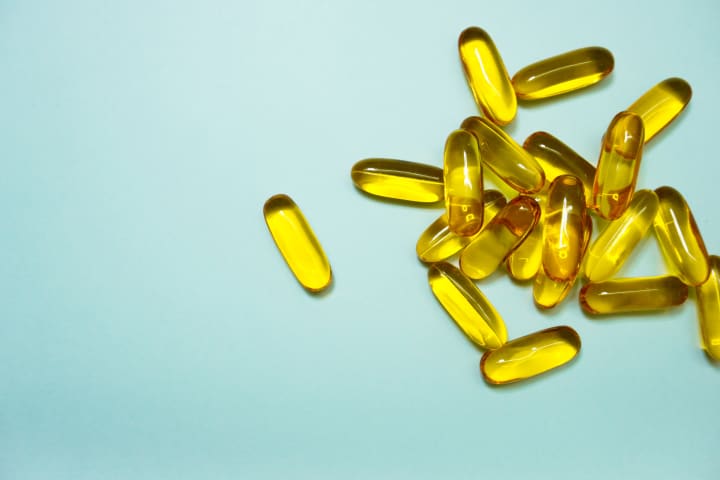Although important, almost everyone is deficient!
The highly regarded nutrient vitamin D

Vitamin D is widely known as a bone-strengthening nutrient. Recent studies have shown that in addition to its significant effects on muscle strength, immunity, and pregnancy, vitamin D also helps prevent cancer, infectious diseases, and diabetes.
Unlike other vitamins, there are two main ways to obtain vitamin D: the "food pathway" from salmon or mackerel, air-dried mushrooms, and the "ultraviolet pathway" from sunbathing, which breaks down cholesterol in the skin (7-dehydrocholesterol).
Generally speaking, vitamins cannot be produced in the body. However, vitamin D is a special vitamin that can be produced on the skin when exposed to sunlight.

The most basic role of vitamin D is to promote the absorption of calcium in the intestinal canal and to strengthen bones or teeth. Even with desperate calcium supplementation, if vitamin D is insufficient, osteoporosis will worsen and thus increase the risk of fracture." Kiyoshi Tanaka, a professor in the Department of Nutrition at Kobe Gakuin University, said this.
A one-year follow-up survey was conducted on 1,393 women over the age of 75. Those with vitamin D deficiency (less than 20 ng/ml of vitamin D in the blood) had reduced muscle strength and 1.4 times the risk of falling than those with 25 ng/ml or more. (Data: Osteoporos Int ; 26, 2185-2192, 2015 )
In addition to the well-known effects on the bones, in recent years, studies on vitamin D have been carried out worldwide and have attracted attention to new facts such as the risk of infertility or depression if vitamin D is insufficient, in addition to improving immunity, reducing the risk of influenza or cancer and diabetes.
One of the newly discovered effects is the "maintenance and enhancement of muscle strength. "There are vitamin D receptors (receptors) in muscles, and vitamin D promotes the synthesis of muscle proteins. If vitamin D is insufficient, even if muscle exercise is performed, protein intake is not possible and it is difficult to enhance muscle strength. Therefore, vitamin D insufficiency, especially in the elderly, increases the risk of falls. Vitamin D is associated with weakness from both skeletal and muscular aspects." (Mr. Tanaka)
Vitamin D receptors are found in organs throughout the body, so "preventing vitamin D deficiency can prevent various diseases throughout the body." Tanaka said.
Although it is such an important nutrient, more than 85% of women are vitamin D deficient regardless of age. Given this situation, the Ministry of Health, Labour and Welfare has increased the standard daily intake of vitamin D from 5.5 μg to 8.5 μg for women over 15 years of age in the 2020 edition of the "Dietary Intake Standards for Japanese People.
The results of a study that measured vitamin D concentrations in the blood of 1,088 women showed that 86.3% of all women, especially 94.2% of those in their 40s, had insufficient vitamin D (blood vitamin D concentrations less than 30 ng/m). (Data: OsteoporosInt; 24, 2775-2787, 2013)
The US and Canadian dietary intake standards recommend a 1-day intake of 15 μg of vitamin D. Combining the food pathway with the UV pathway, aim for a 1-day intake of 15 μg. To strengthen bones and muscles, be active in the sun. People who wear sunscreen should consume more food.
In addition, foods rich in vitamin D are
Sockeye salmon (one piece・100g/33μg)
Swordfish (one piece・150g/14.5μg)
Sardines (2 large spoons of 10g/6.1μg)
Air-dried shiitake mushroom (2 pieces of 6g/0.8μg)
Vitamin D deficiency in women during pregnancy or lactation can affect the bones of infants.
Rickets in infants and children is also increasing due to the proliferation of excessive UV resistance. It is important for women to be aware of vitamin D insufficiency during pregnancy, especially in breastfed infants, and to supplement with vitamin D through nutritional supplements.
Insufficient vitamin D during pregnancy increases the risk of "craniosynostosis" and decreases bone density when the infant's skull is depressed when pressed with a finger. In recent years, the severity of vitamin D deficiency in pregnancy or maternity has been noted, and if breastfeeding is done in this state, the infant can fall into vitamin D deficiency and become susceptible to rickets.

Vitamin D insufficiency in infants is a worldwide problem, and in the international guidelines jointly developed by 11 groups including the American Academy of Pediatric Endocrinology for 14 years, 10 μg of vitamin D per day using nutritional supplements are recommended for infants in the first 12 months of life, regardless of whether they are breastfed or fed formula. in addition, for pregnancy, 15 μg of vitamin D intake using nutritional supplements are recommended.
However, overdosing can instead lead to brittle bones, kidney stones, and possibly hypercalcemia, with a 1-day upper limit of 100μg.
Vitamin D produced by the skin does not cause an excess. Also, the power of vitamin D production decreases with age. If the upper limit is not exceeded, there is nothing to worry about, so it is hoped that nutritional supplements can be lived to prevent vitamin D deficiency in the whole family.
In the season of increased ultraviolet rays, sun protection should also be moderate, and it is also hoped that fish will be eaten consciously.
Infectious diseases, diabetes, cancer, heart disease, depression, dementia ...... The latest research shows that in addition to promoting bone development and enhancing muscle strength, vitamin D can also play a role in disease prevention.
In a study of about 34,000 Japanese men and women, people with high blood concentrations of vitamin D (25 hydroxide vitamin D concentration) had about a 20% lower risk of cancer compared to those who were most deficient.
If vitamin D is sufficient, it reduces the structure of cancer risk, can regulate the immune system and helps to exclude cancer cells.
More notably, vitamin D also has the effect of reducing the risk of acute respiratory infections such as influenza. In a study with elementary school students, the incidence of influenza in the group that consumed 30ug of vitamin D supplements on 1 day was about half that of the non-intake group.
Through the action of vitamin D, a mechanism called autophagy is induced, which excludes pathogens that enter the cells, among others. It has also been shown that vitamin D can prevent diabetes or dementia, heart disease, etc., so it is advisable to increase the concentration of vitamin D in the blood.
Ways to increase the concentration of vitamin D in the blood include fish and shellfish such as salmon and mackerel, the "food pathway" such as air-dried mushrooms, and the "ultraviolet pathway" produced by ultraviolet light exposure to the skin. Vitamin D is metabolized in the liver and kidneys to the active form of vitamin D, which acts on bones, muscles, immune cells, etc.
Dietary intake standards are based on the premise that the UV pathway synthesizes vitamin D, but excessive UV resistance accelerates vitamin D deficiency in women.
In a 50-year literature analysis of women (non-pregnant) aged 15-40+ years investigating blood vitamin D concentrations, 10 of the 22 groups had mean blood vitamin D concentrations below the "vitamin D deficiency" criterion of 20ug/ml. In the remaining 12 groups, 11 groups had a mean value of less than 20-30ug/ml, which is considered "vitamin D deficiency". Studies have shown that vitamin D also plays an important role in the maintenance of pregnancy.
During pregnancy and delivery, vitamin D plays a regulatory role in the immune system.
Among the immune cells that protect the body, there are Th1 cells, which eliminate pathogens, and Th2 cells, which do not reject and accept foreign fetuses. Vitamin D maintains that balance.
It is difficult for modern people to supplement vitamin D with diet alone, so it is important to live with supplements to raise the blood concentration of vitamin D above 30ug/ml for pregnancy activity and disease prevention.
However, excessive intake can cause adverse reactions such as hypercalcemia, and in order not to damage health, the upper limit of intake is 100ug per day.
Physician-prescribed vitamin D preparations are of the active type, so overdose is prohibited, but supplements, like food, are of the natural type. The liver only metabolizes the necessary amount and converts it to the active form, so there is no need to worry about overconsumption. While actively eating fish, you can consume about 25~50ug supplements in 1 day.
Especially for women who are anti-UV, vitamin supplements seem to become a necessity.
About the Creator
Enjoyed the story? Support the Creator.
Subscribe for free to receive all their stories in your feed. You could also pledge your support or give them a one-off tip, letting them know you appreciate their work.






Comments
There are no comments for this story
Be the first to respond and start the conversation.